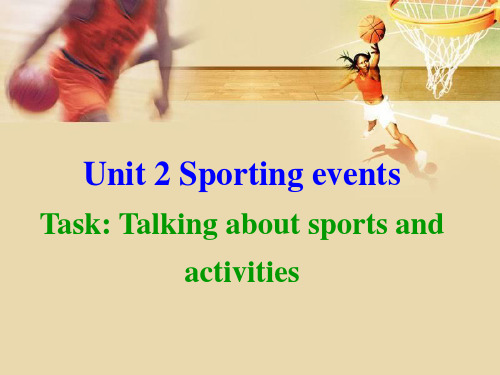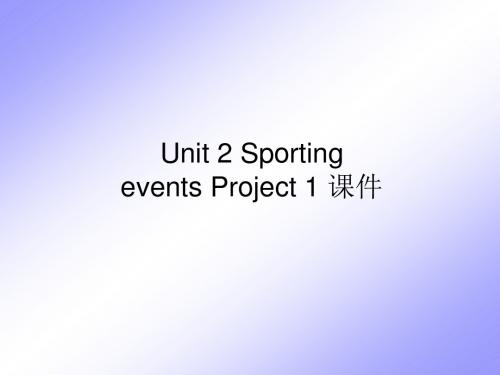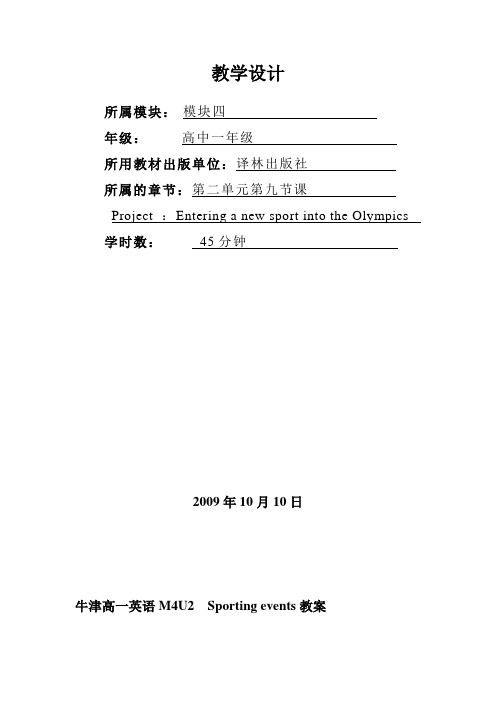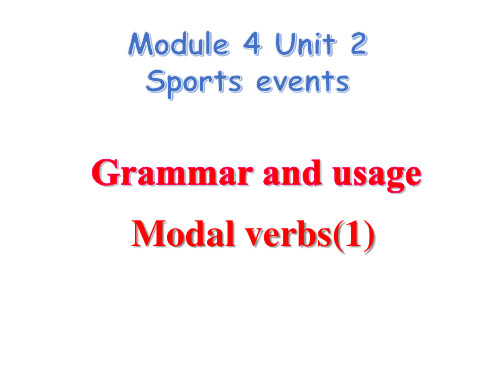牛津高中英语模块四第二单元Sports event1
- 格式:doc
- 大小:80.00 KB
- 文档页数:9



![高一英语模块4第二单元sporting events-新课标[原创] 其它 - 译林牛津版 .ppt](https://img.taocdn.com/s1/m/d7a4c08bbceb19e8b8f6ba85.png)

教学设计所属模块:模块四年级:高中一年级所用教材出版单位:译林出版社所属的章节:第二单元第九节课Project :Entering a new sport into the Olympics 学时数:45分钟2009年10月10日牛津高一英语M4U2 Sporting events教案ProjectAnhua No.2 High School, Hunan LinianTeaching aims:Learn something about entering a new sport into the O;umpics. Write a speech about entering a new sport into the Olympics Important points & difficult points:Write a speech and present it in the classProcedures:Step 1 lead-inI.Do a quiz about Olympics.1.When did the ancient Olympic Games start?A. 1896B. 700BCC. 776BCD. 796BC2. How many gold medals did China get in the 2004 Athens Olympics?A. 28B. 32C. 293. How many gold medals did China get in the 29th Olympic Games?A. 50B. 51C. 41D. 404. Which city is the host city of the first Olympics?5. What’s the motto of the Olympic Games?6. When and where will the next Olympic Games be held?7. What’s the motto of Beijing Olympic Games?II.Guessing gameHow many Olympic sports do you know?1.Archery (Olympic sport since 1900)2.Gymnastics(Olympic sport since 1896)3.Cycling (Olympic sport since 1896)4.Boxing(Olympic sport since 1904)5. Fencing(Olympic sport since 1896)6. Basketball(Olympic sport since 1936)7. Sailing(Olympic sport since 1900)8. Swimming (Olympic sport since 1896)9. Athletics (Olympic sport since 1896)III.1.How many kinds of Olympic Games are there in the world?The Summer Olympic GamesThe Winter Olympic GamesThe Para-lympic Games(残奥会)2. What events(比赛项目) are there for the Summer Olympics?(at least five)What events are there for the Winter Olympics?(at least two)Step 2 ReadingHow can we try to enter a new sport into the Olympics?Ask students to read the article part by part and try to find the detailed information in each part.Then answer the following questions:1.What requirements must be met before a sport can be considered by IOC?2.Which ones are out? Why?3.What other sports will probably be included? Why?4.Which sport is still trying to get into the Olympics?Step 3 SpeechLet students learn how to write a speech.1.Suppose you are one of the members of international association. You will make a speech on Wushu which should be added to the Olympics on the IOC session.2.What is a good speech?A good speech should keep the audience interested all the time.To achieve this, the speaker may tell an interesting story, use quotations or present statistics.3.How to organize your speech•Planning•Work in small groups.•Write down the sport your group has chosen_______________________•Write down the names beside each task.•Research_____________________•Write the speech_______________•Write the outline________________•Give the speech________________。

【教案】译林牛津版模块四Unit 2 Sports eventsWelcome to the unitTeaching Aims:1. Arrange a discussion for Ss to find out why sports are popular around the world.2. Encourage Ss to express their own opinions in the discussion.Try to develop their speaking abilityTeaching Important Point:Develop students’ speaking ability.Teaching Methods:Discussion and free talk to involve each student in class activities. Teaching Aids:1. The multimedia2. The blackboardTeaching Procedures;Step 1 Lead-in by asking the following questions:1. Do you like sports? Why?2. What are your favorite sports?3.What sports do you know? (Show pictures to motivate the students) Step 2 PresentationSport plays a very important role in our lives. We see or do sports almost everyday. Summarize familiar games and understand unfamiliar ones.Ball games:V olleyball, basketball, football, baseball, badminton, table tennis, golf, rugby, ice hockey, etc.Track and field:long jump, high jump, pole jump, discus, shot-put, race, relay race, etc. Water games:swimming, diving and water poloGymnastics:Men’s events---rings, horizontal bar, double bars, parallel bars, vaulting horse, pummeled horse, floor exercise, etc.Women’s events---balance beam, high and low bar, uneven bars, vaulting horse, floor exercise, etc.It is said that gymnastics and diving are two of the most beautiful sports in the world, because they both display elements of strength and beauty.Do you agree?Can you name some famous Chinese gymnasts or divers?Wrestling is an ancient sport often appeared as the main event in the earliest Olympic Games. Wrestling exists in many different styles but only two styles feature in the Olympics, namely freestyle and Greco-Roman. Greco-Roman wrestling allows the use of only the particip ants’upper bodies; however, freestyle allows the use of legs.Boxing became an Olympic sport in 688BC and is still popular today. The boxer uses his or her fists to punch The opponent’s head and body with the aim to knock the opponent out.Kung fu is a traditional sport in China.Are you interested in this sport?Do you enjoy watching kung fu films?Step 3 Practice : Ask Ss to discuss the following questions .What sports do you usually play? How much time do you usually spend doing sports every week?No pains, no gains. No matter what kind of sports you take part in, what do you have to sacrifice (牺牲) in order to be successful in that sport? Step 4 Homework1. Surf the Internet to find more information about sports.2. Write a composition about why people all over the world are crazy about sports.。
牛津高中英语模块四第二单元Sports eve nts胡玉杰Ma Cha ng Middle School Shu Ya ng Cou nty Jia ngsuKey expressi ons and phrases1. be delighted to do sth:乐意做.....-■ be delighted at sth:因为.... 而高兴①We are delighted that you have come here.我们很高兴你来这里②I was delighted at the n ews that he had passed the exam. 他通过了考试的消息让我很高兴。
2. sig ni fica nee: n.重要性,意义be of significanee: 重要,有意义So far, research has n'tproduced anything of great sig ni fica nee. 到目前而言,研究还没有产生任何重要意义。
3. every:每隔广every +基数词+ n(复数):每….. every +序数词+ n(单数):每到第…..every other + n(单数):每隔一...•every few + n(复数):每隔几...①You should plant the tree every three meters你每三米就值树②You should plant the tree every the third meter 你每到第三米就值树③every other line: 每隔一行④every few days: 每隔几天4. compete: vi.比赛,竞争compete with / against sb for sth: 与某人就 .... 比赛/竞争{competition: [k ?mpi / ti?n] n.比赛,竞争competitive: [k ?m x petitiv] adj.比赛的,竞争的competitor: [k ?m / petit?] n.比赛者,竞争者① She is competing with her sister for attention (争宠).② box ing / chess / beauty competiti on③competitive sports:竞争性体育运动5. bring sth to life:赋予..... 以生命;使 .... 生动bring sth back to life: 使.... 重生In the story the artists brought the statue to life.6. under the name of sth:以..... 为别名 /笔名He wrote his no vels un der the n ame of Joh n.7. abse nee: n.不在,缺席,缺乏一in / during one ' absenee:在 . 不在时in the absenee of sth:由于缺乏...①The accide nt happe ned in / duri ng your abse nee.②Police had to release the boy in the abse nee of hard evide nee.③Absenee makes the heart grow fonder.人不见,心更念;久别情更深。
牛津高中英语模块四第二单元Sports events胡玉杰Ma Chang Middle School Shu Yang County JiangsuKey expressions and phrases1. be delighted to do sth: 乐意做……be delighted at sth: 因为……而高兴①We are delighted that you have come here.我们很高兴你来这里② I was delighted at the news that he had passed the exam.他通过了考试的消息让我很高兴。
2. significance: n. 重要性,意义be of significance: 重要,有意义So far, research hasn’t produced anything of great significance.到目前而言,研究还没有产生任何重要意义。
3. every: 每隔every + 基数词+ n(复数): 每…..every + 序数词+ n(单数): 每到第…..every other + n(单数): 每隔一……every few + n(复数): 每隔几……①You should plant the tree every three meters你每三米就值树②You should plant the tree every the third meter你每到第三米就值树③every other line: 每隔一行④every few days: 每隔几天4. compete: vi.比赛,竞争compete with / against sb for sth: 与某人就……比赛∕竞争competition: [kɔmpiˊtiʃn] n. 比赛,竞争competitive: [kəmˊpetitiv] adj.比赛的,竞争的competitor: [kəmˊpetitə] n. 比赛者,竞争者① She is competing with her sister for attention(争宠).② boxing / chess / beauty competition③competitive sports: 竞争性体育运动5. bring sth to life: 赋予……以生命;使……生动bring sth back to life: 使……重生In the story the artists brought the statue to life.6. under the name of sth: 以……为别名∕笔名He wrote his novels under the name of John.7. absence: n. 不在,缺席,缺乏in / during one’s absence: 在……不在时in the absence of sth: 由于缺乏……① The accident happened in / during your absence.② Police had to release the boy in the absence of hard evidence.③Absence makes the heart grow fonder. 人不见,心更念;久别情更深。
8. gold medal: 金牌silver medal: 银牌bronze medal: 铜牌9. hang on: vi. (1) 紧紧抓住(2) 稍等(3) 坚持不懈hang on to sth: (1) 保留,保存(2) 抓紧……① We all hung on as the bus swung around a sharp bend(急转弯).② Hang on! I will be back in a minute.③I know you are tired, but try to hang on a bit longer.④I should hang on to those old photos—they may be valuable.⑤Hang on to that rope, and don’t let go. 抓紧那根绳子,不要松手。
10. attempt: n. & vi. 尝试,努力;试图,企图attempt to do sth:尝试∕试图∕努力做……make an attempt to do sth:in an attempt to do sth: 为了…….① Every time I attempt to convince her, she will shout at me.② In an attempt to control the inflation, the government took many measures.11. push the boundary of sth: 挑战……的极限这个短语还有如下出现形式:push boundaries;push boundaries of sth;push the boundaries of sth。
其含义是:1. extend something beyond limits 将某事物延伸超出界限;2.go beyond the usual limits 突破通常限制或约束;开拓,开辟;拓展①Nowadays some people are wearing a good-looking USB drive around the neck as anecklace which pushes boundaries of taste.现在有些人在脖子上带个漂亮的U盘当做项链,U盘项链拓展了品味的概念界限。
② Wen Jiaobao is trying to push China's political boundaries.温家宝正努力突破中国的政治常规。
③M.I.A. said she makes music to push the boundaries of her own creativity, rather than please anyone else.M.I.A.说她制作音乐目的在于开拓她自己的创造力,而不是取悦于什么人。
12. join sb in doing sth: 和……一起做……Mother joins me in sending you our best wishes.Key sentences1.Many people enjoy playing different sports while others just enjoy watching them.enjoy sth /enjoy doing sthWhile作并列连词用,意思为“而,然而”,表对比。
而but表转折。
注意用心比较体会while与but的句中用意1).Some people waste food while others haven't enough. 有些人很费粮食,然而有些人却吃不饱。
2).The son was having a good meal at home,while the parents were working in the fields.儿子在家吃好饭而父母却在田里辛勤劳作。
3).I ought to have helped her,but I never could. 我本该帮她但没能。
4).Honey is sweet,but the bee stings2. Below are pictures of a few popular sports.这个是倒装句。
介词位于句首需要倒装。
In front of my house are many trees在我房子的前面有很多树。
3.I am delighted to have been invited to your school to talk to you about the history and significance of the Olympic Games.be delighted to do sth: 乐意做……be delighted that: 很高兴……be delighted at sth: 因为……而高兴(to) have been invited to 完成时的被动语态invite sb to +place 邀请…..到…..地方invite sb (not) to do sth 邀请…..(不)做……4. L10-11 At the ancient Olympics, by tradition, the athletes were all men and they had to compete wearing no clothes.wearing no clothes 是分词作伴随状语。
The old man sat in front of his house staring the people nearby老人坐在自己房子前,盯着附近的人。
5.L13-15 Today, both male and female athletes from around the world can take part, no matter what nation they come from.no matter与疑问词who, what, where, when, how, if, whether等连用,意为“无论,不管”。
如:1) Don't open the door, no matter who comes. 不管谁来都别开门。
2) Don't trust him, no matter what he says. 无论他说什么,都别相信他。
3) No matter where you work, you can always find time to study. 无论你在哪里工作,你都能找到时间学习。
4) No matter when and how the invaders come, they will be wiped out clean. 无论侵略者什么时候来,怎样来,他们必将被消灭得一干二净。
no matter who (what, when, where, how, whether等)引导的从句通常在句中作状语,表示让步,但有时也可在句中作宾语No matter which party gets in at the next election, the economy is going to be in a mess.(让步状语从句)Whatever(whoever, whichever, wherever, whomever……)有两个用法,一是引导名词性从句(如主语从句、宾语从句、表语从句),二是用于引导让步状语从句。